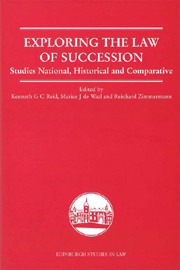Book contents
- Frontmatter
- Contents
- Preface
- List of Contributors
- List of Abbreviations
- Table of Cases
- 1 A Comparative Overview
- 2 Compulsory Heirship in Roman Law
- 3 Succession Law in Scotland – a Historical Perspective
- 4 Succession Law in South Africa – a Historical Perspective
- 5 Freedom of Testation and the Ageing Testator
- 6 Testamentary Conditions and Public Policy
- 7 Forfeiture Clauses and Events in Scots Law
- 8 Revocation of Wills by Changed Circumstances
- 9 Fideicommissary Substitutions: Scots Law in Historical and Comparative Perspective
- 10 The conditio si institutus sine liberis decesserit in Scots and South African Law
- 11 The New Dutch Law of Succession
- 12 Revocability of Mutual Wills
- 13 Succession Agreements in South African and Scots Law
- Index
12 - Revocability of Mutual Wills
Published online by Cambridge University Press: 12 September 2012
- Frontmatter
- Contents
- Preface
- List of Contributors
- List of Abbreviations
- Table of Cases
- 1 A Comparative Overview
- 2 Compulsory Heirship in Roman Law
- 3 Succession Law in Scotland – a Historical Perspective
- 4 Succession Law in South Africa – a Historical Perspective
- 5 Freedom of Testation and the Ageing Testator
- 6 Testamentary Conditions and Public Policy
- 7 Forfeiture Clauses and Events in Scots Law
- 8 Revocation of Wills by Changed Circumstances
- 9 Fideicommissary Substitutions: Scots Law in Historical and Comparative Perspective
- 10 The conditio si institutus sine liberis decesserit in Scots and South African Law
- 11 The New Dutch Law of Succession
- 12 Revocability of Mutual Wills
- 13 Succession Agreements in South African and Scots Law
- Index
Summary
THE DILEMMA OF MUTUAL WILLS
Mutual wills have attracted little interest among legal scholars. Partly, no doubt, this is because only a few jurisdictions recognise their validity, and in some of these they have fallen out of fashion. This is somewhat surprising since, in the past, mutual wills were in use almost all over Europe, especially in the northern regions, and they were widespread in a number of jurisdictions which consider them unlawful today. Developed by custom in the late Middle Ages, mutual wills were recognised as a valid legal instrument in the ius commune. Until the age of codification, they represented a valuable device for families to protect their estates and dispose of them in a way which was consistent with their long-term objectives. In many cases they provided a mechanism of guaranteeing rights of enjoyment to the survivor while at the same time assigning certain items of property to selected beneficiaries.
But if this is so, why did the process of codification often bring about the demise of this legal instrument? In order to understand the reasons, it is first necessary to consider the characteristics of mutual wills. This task is less easy than one would think, for the definitions given in those countries which recognise mutual wills are not uniform. This can be explained to a certain degree by the existence of a broad spectrum of mutual wills.
- Type
- Chapter
- Information
- Exploring the Law of SuccessionStudies National Historical and Comparative, pp. 208 - 225Publisher: Edinburgh University PressPrint publication year: 2007

